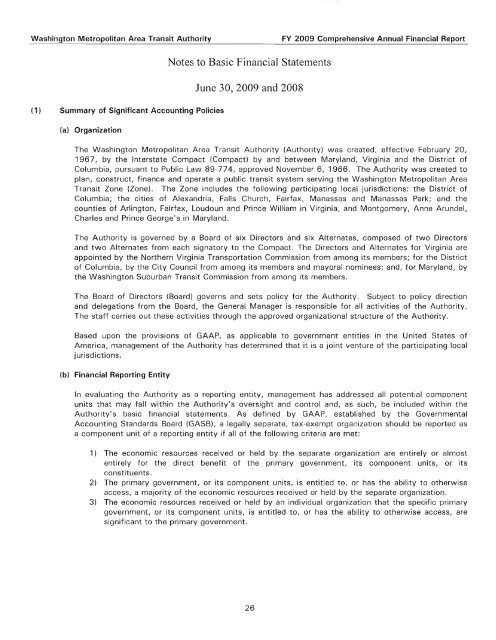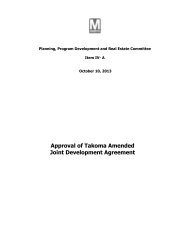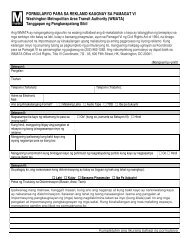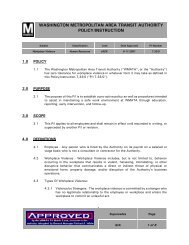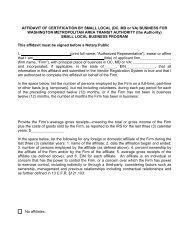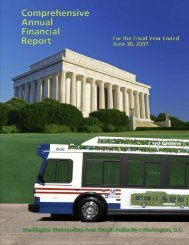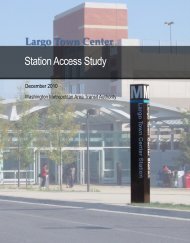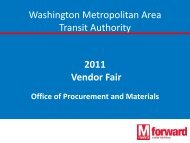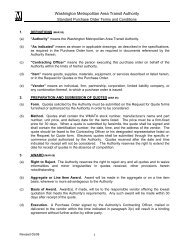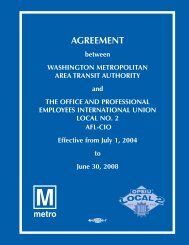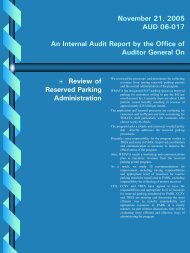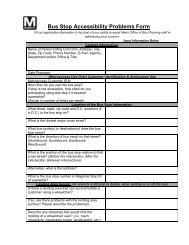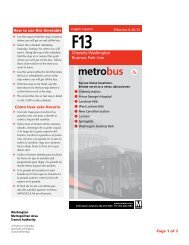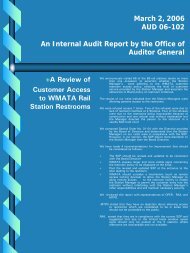Comprehensive Annual Financial Report for the ... - WMATA.com
Comprehensive Annual Financial Report for the ... - WMATA.com
Comprehensive Annual Financial Report for the ... - WMATA.com
- No tags were found...
You also want an ePaper? Increase the reach of your titles
YUMPU automatically turns print PDFs into web optimized ePapers that Google loves.
Washington Metropolitan Area Transit AuthorityFY 2009 <strong>Comprehensive</strong> <strong>Annual</strong> <strong>Financial</strong> <strong>Report</strong>(1 ) Summary of Significant Accounting PoliciesNotes to Basic <strong>Financial</strong> StatementsJune 30, 2009 and 2008(a)OrganizationThe Washington Metropolitan Area Transit Authority (Authority) was created, effective February 20,1967, by <strong>the</strong> Interstate Compact (Compact) by and between Maryland, Virginia and <strong>the</strong> District ofColumbia, pursuant to Public Law 89-774, approved November 6, 1966. The Authority was created toplan, construct, finance and operate a public transit system serving <strong>the</strong> Washington Metropolitan AreaTransit Zone (Zone). The Zone includes <strong>the</strong> following participating local jurisdictions: <strong>the</strong> District ofColumbia; <strong>the</strong> cities of Alexandria, Falls Church, Fairfax, Manassas and Manassas Park; and <strong>the</strong>counties of Arlington, Fairfax, Loudoun and Prince William in Virginia, and Montgomery, Anne Arundel,Charles and Prince George's in Maryland.The Authority is governed by a Board of six Directors and six Alternates, <strong>com</strong>posed of two Directorsand two Alternates from each signatory to <strong>the</strong> Compact. The Directors and Alternates <strong>for</strong> Virginia areappointed by <strong>the</strong> Nor<strong>the</strong>rn Virginia Transportation Commission from among its members; <strong>for</strong> <strong>the</strong> Districtof Columbia, by <strong>the</strong> City Council from among its members and mayoral nominees; and, <strong>for</strong> Maryland, by<strong>the</strong> Washington Suburban Transit Commission from among its members.The Board of Directors (Board) governs and sets policy <strong>for</strong> <strong>the</strong> Authority. Subject to policy directionand delegations from <strong>the</strong> Board, <strong>the</strong> General Manager is responsible <strong>for</strong> all activities of <strong>the</strong> Authority.The staff carries out <strong>the</strong>se activities through <strong>the</strong> approved organizational structure of <strong>the</strong> Authority.Based upon <strong>the</strong> provisions of GAAP, as applicable to government entities in <strong>the</strong> United States ofAmerica, management of <strong>the</strong> Authority has determined that it is a joint venture of <strong>the</strong> participating localjurisdictions.(b) <strong>Financial</strong> <strong>Report</strong>ing EntityIn evaluating <strong>the</strong> Authority as a reporting entity, management has addressed all potential <strong>com</strong>ponentunits that may fall within <strong>the</strong> Authority's oversight and control and, as such, be included within <strong>the</strong>Authority's basic financial statements. As defined by GAAP, established by <strong>the</strong> GovernmentalAccounting Standards Board (GASB), a legally separate, tax-exempt organization should be reported asa <strong>com</strong>ponent unit of a reporting entity if all of <strong>the</strong> following criteria are met:1) The economic resources received or held by <strong>the</strong> separate organization are entirely or almostentirely <strong>for</strong> <strong>the</strong> direct benefit of <strong>the</strong> primary government, its <strong>com</strong>ponent units, or itsconstituents.2) The primary government, or its <strong>com</strong>ponent units, is entitled to, or has <strong>the</strong> ability to o<strong>the</strong>rwiseaccess, a majority of <strong>the</strong> economic resources received or held by <strong>the</strong> separate organization.3) The economic resources received or held by an individual organization that <strong>the</strong> specific primarygovernment, or its <strong>com</strong>ponent units, is entitled to, or has <strong>the</strong> ability to o<strong>the</strong>rwise access, aresignificant to <strong>the</strong> primary government.26


